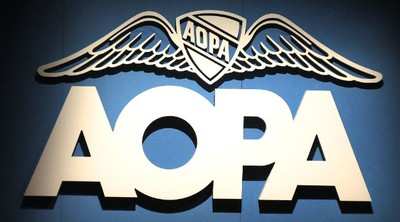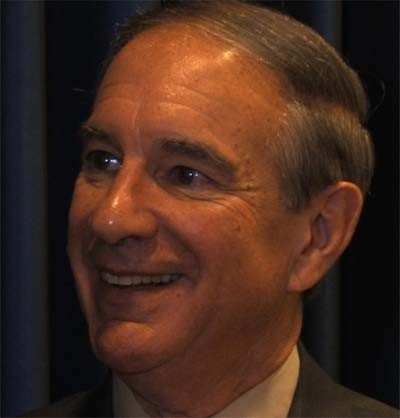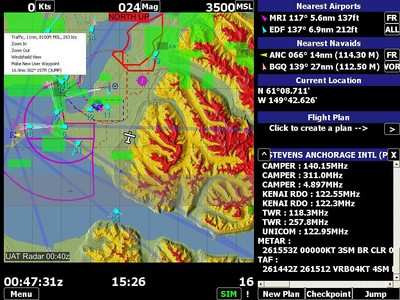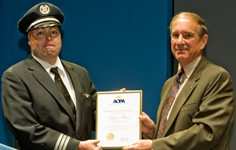Boyer Lauds Management Team For Organization's Success
by ANN Associate Editor Scott Evans
Welcoming attendees to the second day of AOPA Expo 2008,
President Phil Boyer announced the theme for Friday's General
Assembly, simply called "Today."

In almost 70 years of operation, AOPA has come from humble
beginnings of "2000 members in 1939, six percent of the pilot
population then; and today, 414,000 members, 75 percent of the
pilot population."
Taking little credit for the increase himself, Boyer lauded his
management team, each with over a decade of service during his
tenure, as "responsible for a tremendous growth in AOPA membership
over this time."
"We're not as big as other membership organizations, take NRA or
AARP," said Boyer (below). "But if you consider the penetration of
the available pilots versus available gun owners or available
people over 50, we are a real association success story."

Boyer said the most important challenge in the last years of his
presidency has been the issue of user fees. "The statement 'we won
in '08' is correct, but I'm going to disclaim it just a little bit,
and say, 'sort of,'" explaining the battle was won for the moment,
but starts again in 2009.
Turning over the presentation to his management team, Boyer
introduced AOPA Vice President of Government Affairs, Andy Cebula.
"One of the things that was really driving this whole discussion of
user fees was this concept of 'what's going to be the next air
traffic control system?' Cebula said.
"It was code-named NextGen, or the next generation air traffic
control system, and we weren't really sure exactly what it meant,
except for one thing. And that is something called ADS-B," which
started as a good idea but went astray because of a flawed FAA
plan, he said.

Another important issue that has come up in recent years is that
of GA security, Cebula said. "Michael Chertoff, who serves as
Homeland Security Secretary, has on numerous occasions...
pinpointed GA as a concern, and it's a concern that isn't
necessarily justified as we can see it.
The TSA is responsible for other proposed regulations
challenging GA, such as the Customs Border Crossing Rule and the
"12,500 Rule," which threaten to take a concept that's being used
right now in the air charter community...and apply it to GA,"
Cebula said.
 Executive Vice
President of Communications Karen Gebhart said her role in AOPA has
been to get the word out about GA. Telling the hard stories and the
inspirational stories has "created a new interest...one that goes
beyond learning about the latest in aviation or our advocacy."
Executive Vice
President of Communications Karen Gebhart said her role in AOPA has
been to get the word out about GA. Telling the hard stories and the
inspirational stories has "created a new interest...one that goes
beyond learning about the latest in aviation or our advocacy."
Gebhart introduced Logan Flood (right), a pilot whose story was
featured recently in AOPA Pilot magazine. Flood received severe
burns over 85 percent of his body as a result of a plane crash in
2001, and had given up on a career as a pilot as a result.
Citing support from his family to overcome his personal
challenges, Flood said, "Whatever roadblocks you come across, if
you try just a little bit harder, you can make your dreams come
true." An inspiration to others, Flood is now employed as a First
Officer for Republic Airways.
"One of the fun things we've been doing... is our annual
airplane sweepstakes," Gebhart said, which helps increase
readership and interest of AOPA members. This year's sweepstakes
plane, a restored Piper Archer complete with a glass cockpit, is
featured in the Expo's static display at San Jose's airport.
Executive Vice President of Non-dues Revenue Greg Sterling is in
charge of developing AOPA's products and services, advertising, and
investments, which account for 76 percent of the funds needed to
operate AOPA -- and help "to keep our membership dues low and keep
GA strong," Sterling said.

"Our lead product is, of course, the Bank of America
MasterCard...our single largest source of non-dues revenue."
Another AOPA product "I feel every pilot in the room should have"
is the AOPA Legal Services Plan, he said, "because bad things
happen to good pilots."
Wrapping up the morning's presentation was Executive Director of
AOPA's Air Safety Foundation, Bruce Landsberg. "We have the largest
non-governmental database on GA aircraft in the world," he said.
"From 2003 through 2007 there is a very slight decline" in the
overall accident rate, but added "we're wrecking airplanes for
about the same reasons we always have."
Online pilot education is a big thrust of the Air Safety
Foundation, with participants "exceeding 30,000 course completions
every month," Landsberg said. Ongoing ASF pilot training studies
conducted in cooperation with Middle Tennessee State University are
evaluating benefits of using "computer programs such as Microsoft
Flight Simulator" in addition to traditional flight training.
"All of you who are donors, thank you very much, because this
doesn't happen for nothing. If you like what we do, we hope that
you will support us as you get to the end of the year and make a
tax-deductible contribution. We will spend it more wisely than your
government will," Landsberg quipped.
 Aero-News: Quote of the Day (05.01.25)
Aero-News: Quote of the Day (05.01.25) ANN's Daily Aero-Linx (05.01.25)
ANN's Daily Aero-Linx (05.01.25) Airborne 04.25.25: Rob Holland Goes West, NYC Heli Ban, Jepp/ForeFlight
Airborne 04.25.25: Rob Holland Goes West, NYC Heli Ban, Jepp/ForeFlight Airborne 04.30.25: LIFT eVTOL Accident, Musk-FAA NDAs, Med Applications
Airborne 04.30.25: LIFT eVTOL Accident, Musk-FAA NDAs, Med Applications Airborne 04.28.25: Onerous FAA Med Policy, Aviation WX, NFL Team v AeroVanti
Airborne 04.28.25: Onerous FAA Med Policy, Aviation WX, NFL Team v AeroVanti







